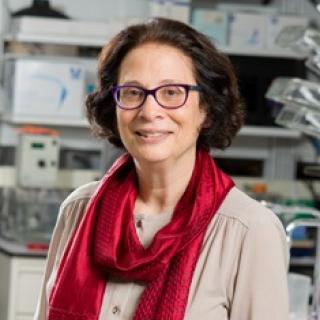
Xinguo Chen, Ph.D.
- Center for Cancer Research
- National Cancer Institute
- Building 560, Room 11-39
- Frederick, MD 21702-1201
- 301-846-1206
- xinguo.chen@nih.gov
RESEARCH SUMMARY
Dr. Xinguo Chen’s research focuses on the biogenesis and regulation of noncoding RNAs. A particular area of interest is the Ro 60 kDa autoantigen (Ro60) and is associated Y RNAs. His research revealed that a bacterial Ro60 protein contributes to cell survival following ultraviolet (UV) irradiation, associates with exoribonucleases to mature ribosomal RNA, and is required for several stress-induced changes in RNA metabolism. He also found that the bacterial Ro60 and Y RNA adapt the exoribonuclease polynucleotide phosphorylase for effective degradation of structured RNAs and that many bacterial Y RNAs contain a domain that resembles tRNA. He also showed that the mouse Ro60 protein contributes to cell survival after UV irradiation, and that Ro60 and Y RNA accumulate in nuclei after irradiation. Excitingly, mice lacking the Ro60 protein develop a lupus-like syndrome, suggesting that Ro60 may be important for preventing autoimmune disease.
Areas of Expertise

Xinguo Chen, Ph.D.
Research
Dr. Xinguo Chen's research is centered on identifying the roles of an abundant class of ribonucleoproteins (RNPs), known as Ro60 RNPs, which are widespread in animal cells and also present in many bacteria. Ro60 RNPs were discovered because the major protein, the ring-shaped Ro 60 kDa autoantigen (Ro60), is a clinically important target of autoantibodies in patients with systemic lupus erythematosus. In all organisms examined, Ro60 binds ~100 nt noncoding RNAs called Y RNAs. Because Ro60 is not present in yeast, he used the first bacterium with an ortholog, Deinococcus radiodurans, as a model organism. He discovered that the bacterial and mammalian Ro60 proteins contribute to cell survival following ultraviolet (UV) irradiation, and that the bacterial ortholog functions with 3’ to 5’ exoribonucleases to adapt RNA pools during some forms of environmental stress. Most recently, he showed that the bacterial Ro60 was tethered by Y RNA to the ring-shaped exonuclease polynucleotide phosphorylase, forming a new bacterial RNA degradation machine. Additionally, he found that bacterial Y RNAs are a new class of tRNA mimics. His discovery of Ro60 and Y RNAs in Salmonella enterica serovar Typhimurium (S. Typhimurium) now allows him to use this genetically tractable human pathogen as a bacterial model. His research is now focused on characterizing the new RNP machine and elucidating the mechanisms by which Ro60 and Y RNAs function in S. Typhimurium.
Publications
Deletion of the rnl gene encoding a nick-sealing RNA ligase sensitizes Deinococcus radiodurans to ionizing radiation
Bacterial noncoding Y RNAs are widespread and mimic tRNAs
An RNA degradation machine sculpted by Ro autoantigen and noncoding RNA
An ortholog of the Ro autoantigen functions in 23S rRNA maturation in D. radiodurans
Biography

Xinguo Chen, Ph.D.
Dr. Xinguo Chen obtained his Ph.D. from the University of Düsseldorf in Germany in 1998. He then joined Dr. Sandra Wolin's lab, Department of Cell Biology, Yale University School of Medicine as a Postdoctoral Associate from 1998 to 2001. In 2001, he was appointed as an Associate Research Scientist. From 2013 to 2017, he was appointed as a Research Scientist. He is currently a Staff Scientist in Sandra Wolin’s laboratory. His research interest is to study the biogenesis and regulation of noncoding RNAs and the function of RNA-protein complexes in cells. His contributions to the RNA field include the discovery of a new bacterial RNA degradation machine called RYPER, the discovery of new roles for noncoding RNAs, and the discovery of a new class of bacterial Y RNAs that are tRNA mimics.
